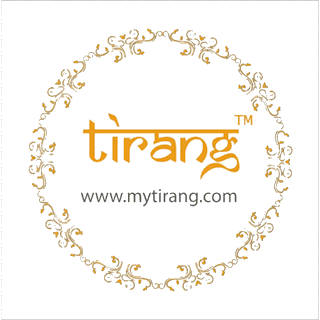Our Story

Tirang evolved from 12 Dec 2015, A Refashioner of Indian Handlooms. Tirang’s commitment has stayed Consistent and will continue under the headship of Mr. Prem Anand Stephen , The Founder with over 3 decades of Experience in the International Fashion Platform.
We at Tirang are a proud admirer of Indian Heritage who believes Sustainability means nothing less of Fashion and heartily embrace the Proud Handloom Artisans of India and Give the World a Contemporary Insight/Style of Indian Tradition. We follow our core commitment of supporting the Handloom Mark weavers to be a part of International Fashion Market with the help of India Handloom and Textile Ministry.
Individually connecting to the Handloom Weavers, we build a respectful relationship with the Beautifully Talented Artisans all over India and bring you their utmost love and care through their Handwoven Fabrics made with Love.
Our Vision
Tirang see the Future world adopting to not just sustainability but embracing Handlooms and its Artisans with so much respect for their Talented Art. In the Long run, Tirang aspire to proudly bring the World’s Handloom Weavers together to embrace their art and give the Handlooms a New Dimension into the Future.Our Channel Partners
At Tirang, We have made it Our Core Policy to Source Only With India Handloom , KVIC and Other Indian DivisionsAn Initiative to Support Indian Divisions
India Handloom
Tirang’s Patriotism toward The Indian Artisans motivated Us to Make The Wise Choice of Sourcing from The India Handloom with India Handloom Mark Certified Weavers. We Take Pride in Directly Connecting to the Highly Talented Dedicated Handloom Weavers of India Though Indian Government and Enhancing Their Business to Compete with The World’s Market.About India Handloom
Development Commissioner for Handlooms was set up as an attached non-participating office on 20th November, 1975 under the Ministry of Commerce. At present it is functioning under the Ministry of Textiles. The Office of the Development Commissioner for Handlooms is headed by an officer of Joint Secretary level having its headquarters at Udyog Bhawan,New Delhi. Development Commissioner (Handlooms) office is assisted by 28 WSCs function across the country. Weavers’ Service Centers play a pivotal role in skill up-gradation, capacity building and disseminating the technological interventions for reducing the drudgery to the handloom weavers and better productivity, thereby improving earning of the weaversTextilesTirang is Grateful and Takes Pride for all The Support from Indian Ministry Of Textiles in Connecting Directly with The Weavers of India to Make Fair Business and Bringing Privilege to The Indian Handloom Art.
About Development Commissioner (Handlooms)
The Office is headed by the Development Commissioner for Handlooms. It administers various schemes for the promotion and development of the handlooms sector and supplements the efforts of State Governments, Societies, NGOs, etc. Its subordinate organisations include Weavers’ Services Centres (WSCs), the Indian Institutes of Handloom Technology (IIHT) and the enforcement machinery for the implementation of the Handlooms (Reservation of Articles for Production) Act, 1985.KVIC
We At Tirang Understand more than anyone The Value of Khadi and Takes privilege in Exposing Khadi As The Most Valuable Fabric. Made with immense Efforts and Energy, Khadi is Born after so much of Valuable Time Spent by the Respectful Handloom Weavers. With So much of Respect , We Appreciate The Support of KVIC in achieving the same.
About KVIC
The KVIC is charged with the planning, promotion, organisation and implementation of programs for the development of Khadi and other village industries in the rural areas in coordination with other agencies engaged in rural development wherever necessary. Its functions also comprise building up of a reserve of raw materials and implements for supply to producers, creation of common service facilities for processing of raw materials as semi-finished goods and provisions of facilities for marketing of KVI products apart from organisation of training of artisans engaged in these industries and encouragement of co-operative efforts amongst them. To promote the sale and marketing of khadi and/or products of village industries or handicrafts, the KVIC may forge linkages with established marketing agencies wherever feasible and necessary. The KVIC is also charged with the responsibility of encouraging and promoting research in the production techniques and equipment employed in the Khadi and Village Industries sector and providing facilities for the study of the problems relating to it, including the use of non-conventional energy and electric power with a view to increasing productivity, eliminating drudgery and otherwise enhancing their competitive capacity and arranging for dissemination of salient results obtained from such research. Further, the KVIC is entrusted with the task of providing financial assistance to institutions and individuals for development and operation of Khadi and village industries and guiding them through supply of designs, prototypes and other technical information. In implementing KVI activities, the KVIC may take such steps as to ensure genuineness of the products and to set standards of quality and ensure that the products of Khadi and village industries do conform to the standards. The KVIC may also undertake directly or through other agencies studies concerning the problems of Khadi and/or village industries besides research or establishing pilot projects for the development of Khadi and village industries.Make In India Products
About Make In India
PROGRAM
The Make in India initiative was launched by Prime Minister in September 2014 as part of a wider set of nation-building initiatives. Devised to transform India into a global design and manufacturing hub, Make in India was a timely response to a critical situation. By 2013, the much-hyped emerging markets bubble had burst, and India’s growth rate had fallen to its lowest level in a decade. The promise of the BRICS Nations (Brazil, Russia, India, China and South Africa) had faded, and India was tagged as one of the so-called ‘Fragile Five’. Global investors debated whether the world’s largest democracy was a risk or an opportunity. India’s 1.2 billion citizens questioned whether India was too big to succeed or too big to fail. India was on the brink of severe economic failure, desperately in need of a big push.PROCESS
Make in India was launched by Prime Minister against the backdrop of this crisis and quickly became a rallying cry for India’s innumerable stakeholders and partners. It was a powerful, galvanising call to action to India’s citizens and business leaders, and an invitation to potential partners and investors around the world. But Make in India is much more than an inspiring slogan. It represents a comprehensive and unprecedented overhaul of outdated processes and policies. Most importantly, it represents a complete change of the government’s mindset – a shift from issuing authority to business partner, in keeping with Prime Minister’s tenet of ‘Minimum Government, Maximum Governance’.India Post
Tirang taking a Responsibility to Rejuvenate The Traditions of India feels pleasure in Partnering with India Post for our Logistics communication. Tirang Proudly Initiates Our Business with Our Nation’s Most Traditional Form of Communication and Appreciates and Encourages Every Human Doing The Same. (PHOTOGRAPH)
About India Post
For more than 150 years, the Department of Posts (DoP) has been the backbone of the country’s communication and has played a crucial role in the country’s social economic development. It touches the lives of Indian citizens in many ways: delivering mails, accepting deposits under Small Savings Schemes, providing life insurance cover under Postal Life Insurance (PLI) and Rural Postal Life I0nsurance (RPLI) and providing retail services like bill collection, sale of forms, etc. The DoP also acts as an agent for Government of India in discharging other services for citizens such as Mahatma Gandhi National Rural Employment Guarantee Scheme (MGNREGS) wage disbursement and old age pension payments. With more than 1,55,000 post offices, the DoP has the most widely distributed postal network in the world.Our Mission
PROTECT – Mother Earth by using Natural Handwoven Fabrics lead. The World towards Sustainability.
SUPPORT – The Indian Handloom Weavers Through India Handloom and Ministry of Textiles, India.
PROMOTE – Make In India Products
CARE – Customers by providing high quality products, with Worthy and efficient service and encourage all towards environmentally sustainable solutions.
Our Social Responsibility
Respecting the Tribal Handloom Fabric Artisans , we are supporting and working with the tribes from parts of India to expand and expose their Handicrafts to the World.
Handlooms has been a pivotal facet of the rich cultural heritage of India and contributes a major part in the Livelihood of Indians. Over the years as Fast Fashion Emerged, Our Eco System has been drained subsequently. As a result, Handloom sector has been exposed to manifold problems as Obsolescence, Technology, Fast Fashion , Constantly changing trend, Consumer behaviour and other Environmental and Economical factors. However, After effective Government intervention through financial assistance and implementation of various developmental and welfare schemes, the Handlooms sector, has been able to tide over these disadvantages, to some extent.
Tirang Initiate to give Fashion assistance to the Indian Heritage Handloom to be beautifully portraited in absolutely Western Fashion while still holding up to be the most Sustainable Fashion Brand. Fortunately The production of Handloom Fabrics is continuing to witness a gradual growth in light of India Handloom , Textile Ministry and Tirang take Pride in being a part of the same and Pledge to contribute our support as we grow.

Our Environment Policy

We Create A New
Environment The Power Of Green

Awards and Certificates
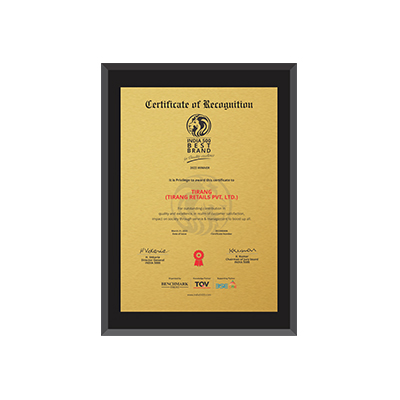




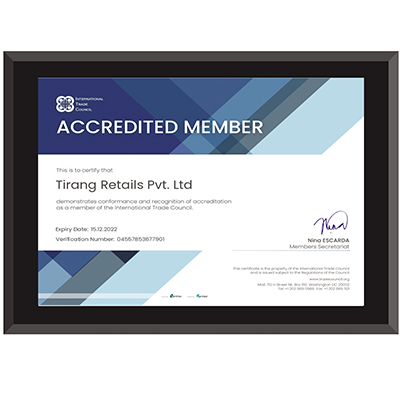
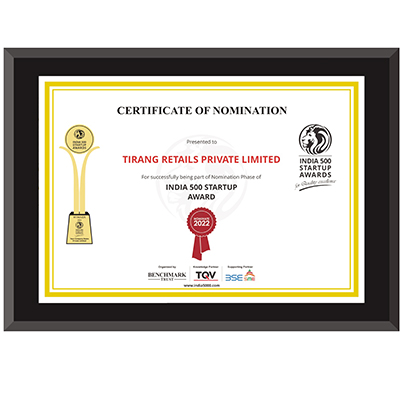

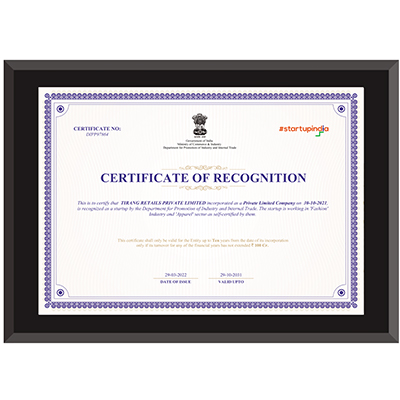
Gift In Need
For so Long, We have let The Idea of Charity and Donation pollute our sense of Humanity. Over Years, Charity and Donation has been spreading a sense of Sympathy in The World that often ended up in Unpleasant situations. We all could agree on being a victim of Unpleasant Sympathy and Yet Would We want another Human to go through the same?
Sustainability being Lasting longer, Let’s Share Our Clothes and House Holds with each other. Tirang’s Soul Motivation being to Create a New Environment, Join with us to equalise the Needs in Our Society. Tirang Creates a Space to make it easy. Once You Purchase our Heartily made Design, Use the Same Packaging to put together your excess clothes and Households and share with the community easily.
Tirang initiates Let’s “Gift In Need” to help you to Share your Excess with the Needy. We help you Gift your Valuables to The Most Deserving ones . Tirang, by Indian Roots Foundation aspire to Balance the Needs and the Resources of The Society by Helping Share the Excess with the Need.
How Does We Work?
- Purchase your most touched design with Tirang and make the Wise choice of Clothing.
- Repack your Excess Clothes and Households in Tirang’s Gift Bag that you received with your Product.
- Attach the Sticker on your Package. Make sure not to use Tirang’s Return Label.
- Book for a “Gift In Need” Pick Up through Our Website.
- Our Logistics Partner, India post will Pick up your package without any charges.
- The package will be delivered directly to The Beautiful Souls in Need and shared Fairly with the Deserving.
Have Beyond Repair Clothes or Households?
For Clothes and House Holds beyond Repair, Tirang Recycles it from The Society and Reuse it in a much Sustainable way.
- Use The Same “Gift In Need” Box to Return your Beyond Repair Households and Clothes.
Tirang Recycles and Refashions and Give Rebirth to the Repairs!
